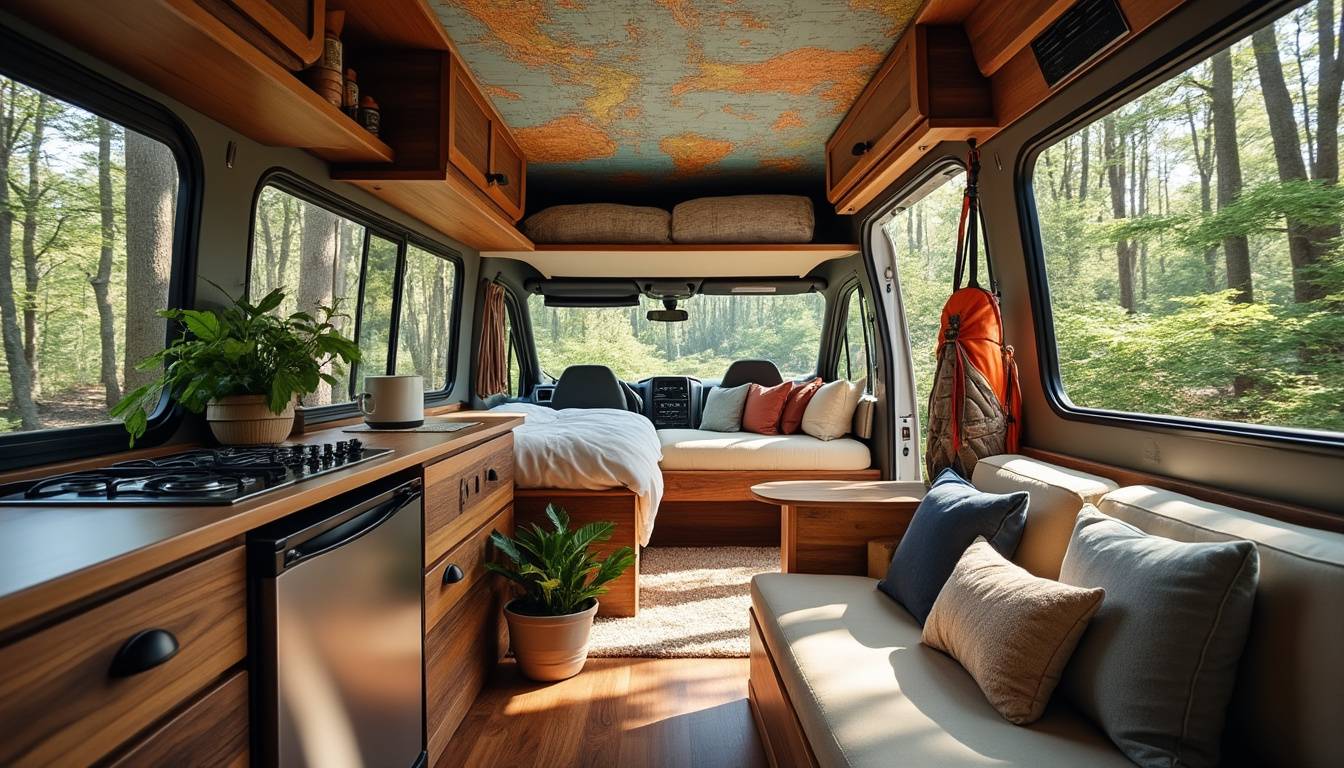Embarking on the vanlife journey is more than just converting a vehicle; it is about crafting a mobile home that fits your unique lifestyle and adventurous spirit. In 2025, with the exploding popularity of vanlife, enthusiasts are not only seeking freedom on the road but also detailed, practical guidance on how to build their ideal van setup. This guide delves deep into the heart of van conversion, merging creativity, comfort, and functionality, to help you create the perfect Adventure Wagon. Whether choosing your first van or upgrading your existing setup, understanding the essentials of vehicle selection, design, and equipment is key to transforming your dreams into a rolling reality.
choosing the ideal vehicle for your vanlife adventure
Selecting the right vehicle forms the foundation of a successful vanlife experience. The market in 2025 offers an impressive range from compact campervans to rugged four-wheel-drive trucks, each catering to different travel styles and budgets. Brands like Nomad Vanz and VanCraft have introduced innovative models that combine durability with versatile interiors, appealing to both beginners and seasoned road travelers.
When choosing your adventure wagon, several factors must be considered:
- Size and maneuverability: Depending on your travel plans, a smaller van might be beneficial for city exploration, while larger vans offer more living space for extended journeys.
- Payload capacity: It’s crucial to ensure your vehicle can support the weight of conversions, equipment, and passengers without compromising safety.
- Fuel efficiency and engine type: Diesel engines provide torque ideal for mountainous terrains, whereas the latest electric and hybrid campervans are emerging as sustainable choices.
- Drivetrain and off-road capability: For explorers eyeing remote destinations, four-wheel-drive options from Campervan HQ and The Van Conversion Company add confidence and versatility.
- Maintenance and availability of parts: Selecting common makes facilitates repairs on the road.
For example, a traveler seeking to balance off-road adventures with city stops might choose a Nomad Vanz model equipped with all-wheel drive, ensuring access to hidden gems without sacrificing urban comforts.
Here’s a comparison table highlighting popular vehicle types for vanlife enthusiasts in 2025:
| Vehicle Type | Advantages | Considerations | Recommended Brands |
|---|---|---|---|
| Compact Campervan | Easy to park; efficient fuel use | Limited living space | VanCraft, Happier Camper |
| Standard Van | Balanced space; versatile | Moderate fuel economy | Adventure Wagon, GoCamp |
| Four-wheel-drive Camper | Off-road capability; rugged | Higher maintenance costs | The Van Conversion Company, Campervan HQ |
| Truck Camper | Durability; easy to customize | Often lacks insulation | Van Beek, Siegel’s Camper Van |
| Electric/Hybrid Campervan | Eco-friendly; low emissions | Range constraints; high initial cost | VanCraft, Happier Camper |
essential vehicle features for comfort and safety
Beyond the basics, prioritizing comfort and safety in your choice can make or break your vanlife experience. Safety features such as advanced driver assistance systems, reinforced frames, and reliable braking are critical given the diverse terrains encountered. Meanwhile, comfortable driving seats, insulation from noise and temperature extremes, and optimized interior space design elevate daily living aboard.
- Insulation and ventilation: High-quality insulation paired with efficient ventilation systems preserves interior comfort across all seasons.
- Heating and cooling options: Compact heaters and portable air conditioning units extend livability in extreme climates.
- Security systems: Alarms and GPS trackers help protect your valuable mobile home from theft or intrusion.
- Exterior build materials: Aluminum and composite panels reduce weight while providing durability.
- Energy-efficient lighting: LED fixtures minimize power consumption while maintaining brightness.
Ultimately, your vehicle choices set the tone for how your vanlife unfolds — prioritizing the balance between ruggedness and comfort allows for a versatile, enjoyable journey.
smart layout design for functional van conversion projects
Once you’ve selected your vehicle, planning the layout of your campervan interior is the next crucial step. This involves optimizing every square inch to serve multiple functions while maintaining a sense of openness and ease of movement — a hallmark of thoughtful vanlife design.
Some key principles guide a successful layout:
- Zone separation: Creating distinct living, cooking, sleeping, and storage areas minimizes clutter and improves daily flow.
- Modular and multi-functional furniture: Pieces such as fold-away tables, convertible beds, and slide-out kitchen units maximize versatility.
- Accessibility: Items and storage should be within easy reach, keeping safety and efficiency in mind, especially in a moving vehicle.
- Natural light use: Skylights and large windows enhance spaciousness and connection with the outside environment.
- Customization for lifestyle: Whether you travel solo, as a couple, or with family or pets, layouts must accommodate your unique needs.
For example, GoCamp‘s recent modular interiors demonstrate how flexible cabinetry adapts to cooking, working, or relaxing with little effort. Similarly, innovations by Van Beek incorporate pet-friendly flooring and integrated sleeping options, underscoring attention to detail for different vanlifers.
The following table outlines common interior layout styles and their benefits:
| Layout style | Key features | Best for |
|---|---|---|
| Rear bed with side kitchen | Clear separation, ample sleeping space | Solo travelers; couples |
| Convertible lounge/dining | Multi-function with social space | Families; vanlife social groups |
| Pop-up or raised roof camper | Extra headroom; sleeping pods | Extended trips; standing comfort |
| Slide-out kitchen and seating | Outdoor extension for cooking & socializing | Adventure seekers; gatherings |
Smart planning also integrates wiring, water systems, and storage channels hidden within furniture, all contributing to a seamless daily flow.
equipping your vanlife conversion with essential appliances and gear
A well-equipped vanlife vehicle strikes the perfect balance between self-sufficiency and comfort. The best conversions include compact, high-efficiency appliances and innovative gear, designed with space-saving and energy conservation in mind.
Among the essentials for any vanlife setup:
- Kitchen appliances: Portable stoves, induction cooktops, compact refrigerators, and collapsible sinks allow for diverse meal preparation without bulk.
- Energy systems: Solar panels paired with lithium batteries provide sustainable power for electronics, lighting, and heating.
- Water management: Tanks with filtration systems, hand pumps, and hot water heaters keep your supply clean and convenient.
- Heating and cooling: Efficient diesel heaters or roof vents maintain comfortable temperatures.
- Connectivity and entertainment: Mobile routers, satellite internet options, and compact audiovisual setups keep you connected and entertained on the road.
Brands such as Vanlife Gear specialize in tailor-made solutions offering lightweight, durable, and functional tools designed specifically for mobile living. Similarly, Siegel’s Camper Van integrates technology cleverly, with smart control panels that monitor energy usage and water levels.
Below is an overview of popular appliances and their key benefits:
| Appliance | Features | Benefits | Recommended brands |
|---|---|---|---|
| Portable induction cooktop | Lightweight, energy-efficient, quick heating | Space saving, safer cooking | Vanlife Gear, Nomad Vanz |
| Compact fridge/freezer | Low power draw, dual zone options | Food preservation on the go | Happier Camper, VanCraft |
| Solar panels | High conversion efficiency, flexible mounts | Renewable energy source, autonomy | Van Beek, The Van Conversion Company |
| Diesel heater | Compact, low fuel consumption, rapid heating | Comfort in cold climates | Campervan HQ, Siegel’s Camper Van |
| Water filtration system | Portable, easy to install, multi-stage filtration | Clean drinking water anywhere | Vanlife Gear, GoCamp |
mastering the technical aspects: electricity, water, and insulation for your van
Building a fully functional van that supports off-grid living demands careful attention to technical systems including electrical wiring, water management, and insulation. These essential components ensure comfort, safety, and autonomy throughout your travels.
Electrical setups have evolved in recent years. Modern van builders favor flexible lithium-ion batteries combined with solar arrays. This combination provides substantial energy for appliances while keeping weight minimal. Companies like The Van Conversion Company and Van Beek offer customizable energy kits, catering to varying power needs.
Water systems must be designed for efficiency and ease of use. Incorporating fresh water tanks, greywater systems, and filtration ensures clean water supply and environmentally sound disposal. Compact sinks with retractable faucets and shower attachments optimize space.
Insulation is critical to regulate interior temperatures and reduce noise pollution. Advanced materials such as sheep’s wool, aerogel, and reflective foam panels are increasingly popular for their thermal and acoustic properties. Partnering with experts like Adventure Wagon grants access to high-quality insulation solutions tailored for vans.
- Electrical system considerations: Battery capacity, inverter power, solar panel efficiency, and wiring safety.
- Water system components: Tank size, filtration type, pump reliability, and drainage setup.
- Insulation materials and installation: R-value, moisture resistance, and environmental impact.
To offer perspective, here is a simplified specification table for a typical 2025 vanlife technical setup:
| System | Component | Specification | Purpose |
|---|---|---|---|
| Electrical | Lithium-ion battery bank | 300Ah capacity | Power lights, electronics, heating |
| Electrical | Solar panels | 400W flexible panels | Renew energy for battery charging |
| Water | Fresh water tank | 80 liters | Drinking, cooking, washing |
| Water | Grey water tank | 60 liters | Collect waste water |
| Insulation | Sheep’s wool | High R-value, natural | Temperature regulation |
navigating the vanlife lifestyle: tips, challenges, and community support
Living the vanlife dream means immersing yourself in a nomadic lifestyle full of wonders and challenges. Beyond technical know-how, true success depends on adaptability, resourcefulness, and connection.
New vanlifers often encounter unexpected challenges ranging from vehicle maintenance to managing resources like water and power. Tackling these with a positive mindset and proactive habits makes all the difference. Experienced vanlifers encourage newcomers to:
- Establish routines: Regular equipment checks, cleaning, and planning reduce stress on the road.
- Engage with the community: Platforms from Vanlife Gear discussion forums to meet-ups hosted by Adventure Wagon foster knowledge sharing and camaraderie.
- Stay flexible: Weather, mechanical issues, and spot availability all require adaptable plans.
- Embrace minimalism: Prioritize essential possessions to maintain a clutter-free environment and ease of mobility.
- Document your journey: Sharing stories and tips on social media or blogs enriches the experience and inspires others.
For families and group travelers, books like “Vanlife en famille : Osez la liberté!” demonstrate strategies for creating joyful, safe experiences in small mobile spaces. Meanwhile, solo adventurers can find motivation in stories from Siegel’s Camper Van or VanCraft travelers pushing boundaries.
recommendations for maintaining your van on the road
Proper vehicle maintenance is another cornerstone of an enjoyable journey. Here are essential tips:
- Conduct pre-trip and post-trip inspections focusing on tires, brakes, fluids, and battery health.
- Keep a set of basic tools and spare parts on board to manage minor repairs.
- Use trusted service centers specializing in campervan maintenance when available.
- Monitor electrical and plumbing systems frequently, especially during seasons with extreme weather.
- Clean exhaust and ventilation systems regularly to maintain air quality.
how to make the most of vanlife adventures
Vanlife offers unparalleled freedom to explore at your own pace. To fully enjoy your roving lifestyle:
- Plan routes but leave room for spontaneous detours to hidden gems.
- Use apps and websites to find safe and scenic overnight spots.
- Respect local communities and nature conservation rules.
- Balance digital detox with necessary connectivity for work or social interaction.
- Engage with fellow travelers and local cultures to deepen your experience.
faq about vanlife vehicle conversion and lifestyle
- Q: What type of vehicle is best for first-time vanlifers?
A: For beginners, a standard van like those offered by Adventure Wagon or GoCamp blends manageable size and conversion ease, making it a solid choice. - Q: How do I ensure my van is energy-efficient?
A: Incorporate solar panels coupled with a lithium-ion battery bank, use energy-saving LED lights, and select appliances designed for low power consumption, such as those from Vanlife Gear. - Q: Can families comfortably live in a van?
A: Yes, with smart layouts and modular furniture from experts like Van Beek, families can enjoy spacious, organized spaces that suit their unique needs. - Q: What are common challenges faced living on the road?
A: Managing resources, vehicle maintenance, and adapting to weather changes are typical, but forming community connections through forums and meet-ups can provide support. - Q: Are electric campervans practical for long trips?
A: While current models from VanCraft and Happier Camper offer eco-friendly benefits, limited range and charging infrastructure are considerations for extended journeys.


